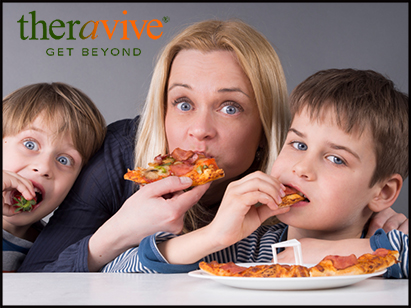 Food role models
Food role models
Despite the fact that children spend a large portion of their time at school and other activities, their foremost role models for food, health, and weight will always be their parents.
Children mirror parental behaviors. The quality of those behaviors is more important than ever in light of the current Obesity crisis.
Although many factors have contributed to the increase in American Obesity, the foremost important behaviors in the provision of a healthy food environment are to A) Eat at home, and B) Eat in Moderation.
Many parents underestimate the power that these two concepts play in childhood development.
However, these two factors play the most potent role in defining a child’s relationship with food, and shaping lifelong habits.
Stopping the take-out train: No fast food, takeout, or restaurant meals during the week.
It’s important for children to understand that a busy schedule does not justify poor self-care.
Often, multiple commitments and a lack of planning lead families to forgo home-cooked meals in lieu of fast food or restaurant meals.
While many restaurants do offer healthy selections, the majority operate under a “health halo”- that is, a small number of items are truly healthy, while the majority of the menu and side dishes that accompany the healthy fare are decidedly not.
A six inch Subway sandwich with turkey, cheese, and avocado, for example, contains 400 Calories.
However, many parents are often more likely to purchase a full meal for their child rather than a single item, because an entrée and side dishes fulfills our preconceived notions of what a meal “should” be.
Unfortunately, many parents don’t consider the realities of the Caloric cost.
For example, when you add on a cookie or a bag of chips (the two side items available at Subway) that meal climbs to about 600 Calories- 40% of the daily Caloric need of an 8 year old girl, or 33% of the average woman’s daily Caloric needs.
When you consider that most elementary school lunches contain 800 Calories (yes, even under the new “healthier lunch” laws), and that vast majority of children under age 10 need no more than 1800 Calories per day, eating out at dinner multiple night per week has the potential to hugely impact a child’s weight.
 Stress Free Food Prep
Stress Free Food Prep
You should aim to eat at home at least five nights a week.
Many families believe that they are too busy to prepare healthy meals on weeknights, but healthy meals needn’t be time-intensive: soups, salads, stir-fries, and sandwiches are all easily prepared, tasty, balanced, and filling meals that can easily serve family needs on a busy weeknight.
Try making an automated meal schedule- Monday Sandwiches, Tuesday Soup, Wednesday Salad, Thursday Stir-fry, and Friday Meal of Choice.
Automating a schedule allows you to shop once each week, with variety depending upon specific type (type of salad: grilled chicken vs shrimp vs light taco salad, etc).
An automated schedule also allows you to plan ahead and leave specific tasks for family members: whoever gets home first puts chicken in oven, children can chop vegetables, and assembly and eating are performed together.
Practice True Moderation
For the general population, dietary moderation is a difficult concept to define- one person’s moderation may be another person’s gluttony.
True dietary moderation is achieved when Caloric balance is obtained and all food groups are recognized.
However, a moderate diet also includes “treats”- foods that might not otherwise fit within the parameters of healthy eating, but that give us pleasure and solicit enjoyment.
Children who are raised in highly restrictive environments tend to rebel in secret, or later as adults.
Children should be taught how to appropriately consume all types of foods, with parents acting as models and guides for the time, place, and portion sizes of “treat” items.
Modeling Moderate Behavior
Although moderate behaviors may seem simple to implement, many adults have complicated relationships with food that may negatively impact their children.
Emotional eating, eating out of boredom, binge-eating, and neglecting vegetables are all poor habits that parents frequently and inadvertently model for their children.
If you feel that you struggle with these or any other food-related issues that impact your ability to serve as a role model for your children, consider seeing a therapist to support your personal development and learn healthy strategies and coping mechanisms.
Answering the “Why?”: Talking to Children about Food
Although children are often disappointed upon being told no or not allowed to do as they’d wish, they are often more receptive to change if you solicit a discussion about the issue.
If your child is angry or disappointed by your unwillingness to buy an item or cater to an unhealthy behavior, try explaining to them, very basically, why they can’t have that item right now.
For example,
“We aren’t going to go to Taco Bell for dinner because we have plenty of food at home that is better for us, and we need to take care of our bodies.”
Or,
“I’m not going to buy cookies right now because we’ve had a lot of things today that are very high in fat/sugar, and too much fat and sugar is bad for our health. We can have cookies another day. Can you think of something else you could have that is a little healthier?”
Striking the right balance between family and food is difficult. If you feel that your family is struggling to overcome food-related issues, family therapy sessions provide a positive, constructive outlet to facilitate discussion, assess problem areas, and open the pathways of communication to achieve a healthy family atmosphere.
Christie Hunter is registered clinical counselor in British Columbia and co-founder of Theravive. She is a certified management accountant. She has a masters of arts in counseling psychology from Liberty University with specialty in marriage and family and a post-graduate specialty in trauma resolution. In 2007 she started Theravive with her husband in order to help make mental health care easily attainable and nonthreatening. She has a passion for gifted children and their education. You can reach Christie at 360-350-8627 or write her at christie - at - theravive.com.